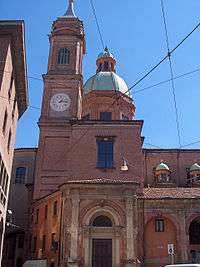Santi Bartolomeo e Gaetano
| Santi Bartolomeo e Gaetano | |
|---|---|
 | |
| Basic information | |
| Location | Bologna, Emilia-Romagna |
| Affiliation | Roman Catholic |
| Year consecrated | 1516 |
| Architectural description | |
| Architect(s) | Andrea Marchesi, Giovanni Battista Natali, and Agostino Barelli |
| Architectural type | Church |
| Architectural style | Renaissance |
Santi Bartolomeo e Gaetano is a Renaissance style, Roman Catholic church in central Bologna; it is located near the Due Torri adjacent to the Strada Maggiore.
A church at the site dedicated to St. Bartolomeo had existed since the 5th century; it was likely built atop an even older church and housed Benedictine monks till the 16th century. The church was designed by Giovanni Battista Falcetti with elaboration by Agostino Barelli, and owes the awkward facade to arising at the site of a palace begun by Andrea da Formigine in 1517 and commissioned by a member of the Gozzadini. The project, which is seen in the single-story portico along the exterior, was interrupted after the death of the patron, soon after completion of what became the side portico.
In 1599, the church came under the leadership of the Theatines, and in 1627, it led to a complete restructuring of the complex by Giovanni Battista Natali, called il Falzetta, and by Agostino Barelli. In 1671, when Cajetan, the founder of the Theatine order was canonized, the church gained the added name. The bell-tower and final chapels were completed by 1694.
Interiors
The ceiling of the cental nave has a Vision of San Gaetano (1667) by Angelo Michele Colonna and Giacomo Alboresi. The second altar on the right has a San Carlo Borromeo at the cemetery of Varallo (1614) by Ludovico Carracci. The 4th altar on right has an Annunciation (of the Beautiful Angel) (1632) by Francesco Albani and he also painted the lateral wall frescoes (1633) depicting a Nativity and Dream of Joseph. In the ceiling of transept is depicted a Glory of San Stefano (1695) by Giovanni Antonio Burrini and Marcantonio Chiarini. The apse has a depiction of the Martyrdom of San Bartolomeo and Two Miracles of the Saint, 1685 frescoes by Marcantonio Franceschini and Luigi Quaini. The cupola (1691) was decorated by Giuseppe and Antonio Rolli. The chapel of the left transept has a Beato Paolo Buralli (1772) by Ubaldo Gandolfi and a small Madonna with sleeping Jesus (1632) by Guido Reni.[1]
The lunettes of the portico were decorated with scenes from the life of St. Cajetan, including one by Lucio Massari. The Baroque interior also has paintings by Alessandro Tiarini, Ercole de Maria, and Carlo Baldi.
Sources
- ↑ Emilia Romagna, by the Touring Club Italiano, Touring editore srl, 1991, page 185.
Coordinates: 44°29′39″N 11°20′50″E / 44.49417°N 11.34722°E